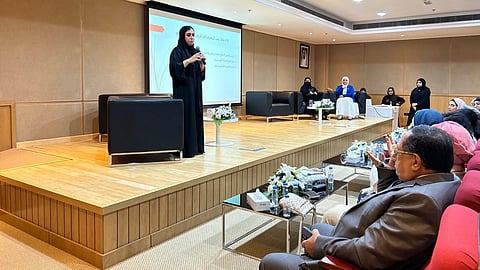From patient to advocate: Shaima Al Mazmi inspires at Sharjah’s World Mental Health Day Symposium
Al Mazmi shares her journey of hope

Sharjah, UAE: When Shaima Al Mazmi stood before the audience at the World Mental Health Day Symposium organised by the Sharjah Social Services Department (SSSD), she wasn’t just another speaker — she was a living example of hope and recovery.
At 23, Shaima was diagnosed with a severe mental disorder that led to delusions and paranoia. “I felt constantly watched and unsafe — to the point that I once went to the police station and reported that my own family wanted to harm me,” she recalled. Her condition eventually led to her admission to Al Amal Hospital, where she underwent intensive treatment for five years.
Today, Shaima is a mental health content creator, author, and entrepreneur, using her voice to break the silence around mental illness. “I am not ashamed of having been a mental health patient,” she told the audience. “On the contrary, I share my story so others can find strength in it. Recovery is possible.”
Her journey—from fear and delusion to education and empowerment—has made her one of the UAE’s most compelling advocates for mental well-being. She has written two books, including one about her own story and another titled The Teapot. After completing her university studies and earning a master’s degree in psychology, Shaima now dedicates her work to raising awareness and promoting understanding about mental health through social media and public talks.
Sharjah marks World Mental Health Day
Shaima’s moving story set the tone for a symposium filled with empathy, insight, and inspiration. Organised by Wahat Al Rushd Center, an affiliate of the Sharjah Social Services Department, in cooperation with the Sharjah Center for Learning Difficulties and the Al Sondos Center for Rehabilitation, the event was held at the Department of Islamic Affairs to mark World Mental Health Day.
The symposium brought together mental health specialists, educators, and advocates, all united by a shared message: mental health is vital to every aspect of our lives. Participants stressed that when the mind is healthy, the body follows, and called for an end to the stigma surrounding mental illness.
They urged society to view mental health conditions as legitimate medical issues — no different from physical illnesses — and to replace judgment with compassion and understanding.
Understanding mental illness
Dr Aida Hashem Mohamed, Psychological Therapy Consultant at the SSSD, praised the UAE’s advanced mental health services and the comprehensive care available to patients. She highlighted the department’s dual role in both treatment and community education.
“Mental illness can arise from a sudden traumatic event or a difficult experience that changes a person’s life entirely,” She explained. “That’s why early intervention and psychological support are crucial to reducing suffering and restoring balance.”
She outlined a multi-level approach:
• Families should listen without judgment, provide emotional safety, reduce pressure, and encourage treatment when needed.
• Individuals should recognise their need for support, develop coping skills, practice self-compassion, and commit to recovery plans.
The power of self-reconciliation
Dr Amal Abdel Al Moula, Director of Al-Sundus Center for the Rehabilitation of People of Determination, underscored that mental health is as essential as physical health, since it directly influences how we think, feel, and act.
She urged people to reconcile with themselves, adapt to life’s challenges, and make full use of their personal skills and capacities. “Good mental health promotes learning, productivity, and the ability to build healthy relationships,” she said. “It’s also what allows us to make wise decisions and live with balance.”
Dr Abdel Al Moula explained that mental well-being is not simply the absence of illness — it is a state of harmony that enables individuals to face crises with awareness and resilience. Chronic stress and anxiety, she noted, can lead to physical problems such as high blood pressure, heart disease, and sleep disorders.
Her advice: “Focus on reducing stress rather than eliminating it completely. Set your priorities, believe in your ability to change, and remain positive in your behaviour and outlook.”
A global commitment to mental health
Huda Al Kaabi, psychologist and self-development coach, reminded attendees that World Mental Health Day — celebrated every October 10 —is a global effort to raise awareness about mental health and emphasises the need for psychological support, especially during crises and disasters.
She defined mental health as the ability to cope positively with difficult situations and adapt to sudden change while maintaining emotional stability. “The way people are affected by crises depends on factors such as the nature of the event, the support system around them, and their own resilience,” she said. “Mental health is the foundation of strength — it helps us face adversity with awareness, support, and hope.”
Breaking the stigma
Addressing one of the most sensitive issues, Wisam Jalal Al Kilani, psychologist at the Sharjah Center for Learning Difficulties, spoke about the social stigma that still surrounds mental illness.
She explained that fear of judgment or social shame often prevents individuals from seeking help. “Many worry about their reputation or feel guilty for struggling,”
She recounted the story of a student who faced psychological challenges and was subjected to bullying by his classmates due to his stuttering. The constant ridicule caused him to withdraw socially, deepening his sense of isolation. As he progressed to university, these difficulties persisted, resulting in severe emotional distress, diminished motivation, and a significant decline in self-confidence.
A shared message of hope
By the end of the event, one message resonated among all speakers and participants: mental health is everyone’s responsibility.
The symposium called for continued public awareness, early intervention, and empathy toward those suffering in silence.
Sign up for the Daily Briefing
Get the latest news and updates straight to your inbox






